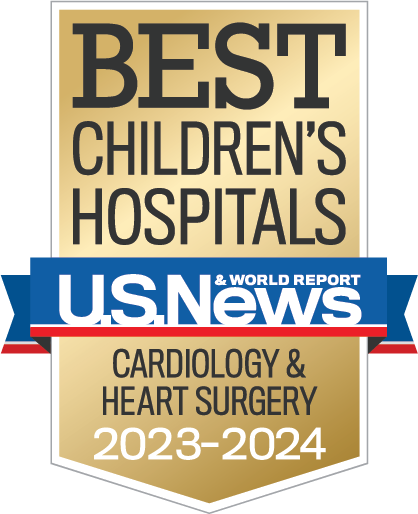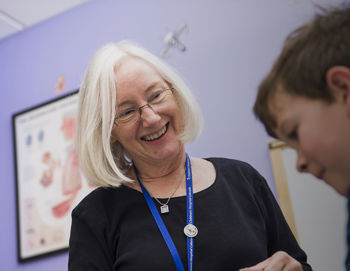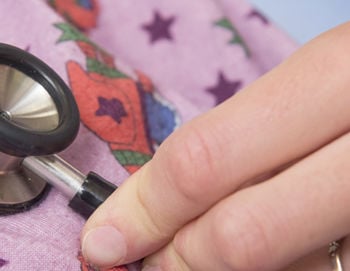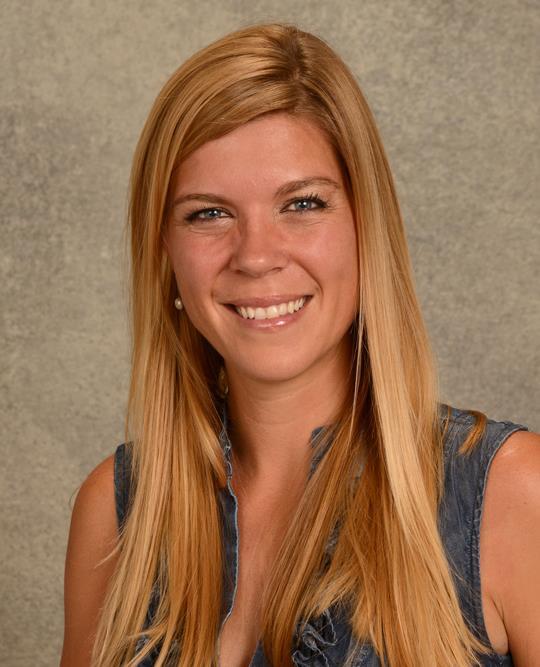- Doctors & Departments
-
Conditions & Advice
- Overview
- Conditions and Symptoms
- Symptom Checker
- Parent Resources
- The Connection Journey
- Calm A Crying Baby
- Sports Articles
- Dosage Tables
- Baby Guide
-
Your Visit
- Overview
- Prepare for Your Visit
- Your Overnight Stay
- Send a Cheer Card
- Family and Patient Resources
- Patient Cost Estimate
- Insurance and Financial Resources
- Online Bill Pay
- Medical Records
- Policies and Procedures
- We Ask Because We Care
Click to find the locations nearest youFind locations by region
See all locations -
Community
- Overview
- Addressing the Youth Mental Health Crisis
- Calendar of Events
- Child Health Advocacy
- Community Health
- Community Partners
- Corporate Relations
- Global Health
- Patient Advocacy
- Patient Stories
- Pediatric Affiliations
- Support Children’s Colorado
- Specialty Outreach Clinics
Your Support Matters
Upcoming Events
Child Life 101
Wednesday, June 12, 2024Join us to learn about the work of a child life specialist, including...
-
Research & Innovation
- Overview
- Pediatric Clinical Trials
- Q: Pediatric Health Advances
- Discoveries and Milestones
- Training and Internships
- Academic Affiliation
- Investigator Resources
- Funding Opportunities
- Center For Innovation
- Support Our Research
- Research Areas

It starts with a Q:
For the latest cutting-edge research, innovative collaborations and remarkable discoveries in child health, read stories from across all our areas of study in Q: Advances and Answers in Pediatric Health.


Arrhythmia and Electrophysiology Program
Arrhythmia in Children
We specialize in the big things, the small things and everything in between.

What is arrhythmia?
An arrhythmia is an abnormal heartbeat (too fast, too slow or irregular) that can cause the heart to pump less blood to the body than it should. Sometimes arrhythmias are harmless. Other times, an arrhythmia is dangerous and can cause damage to the heart muscle and the entire body.
What causes arrhythmia in children?
In a healthy heart, a group of nerves in the upper right heart chamber (right atrium) sends small electrical signals to the heart muscles that make them contract and expand in a regular rhythm. This creates a heartbeat and ensures that the heart is pumping enough blood to the body. Your doctor may refer to this as cardiac output.
But in some cases, the nerve group doesn't send the correct electrical pulses. In other cases, those electrical pulses don't travel through the heart appropriately, or they go too fast or too slow. This creates an arrhythmia.
Who gets arrhythmia?
Arrhythmias are more common in adults, but they can happen at any age. Children can be born with or develop arrhythmia in childhood. In these cases, doctors refer to them as pediatric arrhythmias. At Children’s Hospital Colorado, experts in our Heart Institute and Colorado Fetal Care Center may be involved in you or your child’s treatment and care.
What are the signs and symptoms of pediatric arrhythmia?
Common cardiac arrhythmia symptoms can include:
- Heart palpitations, or the sudden starting and stopping of a heart rhythm that is too fast to count
- Fluttery feeling in the chest
- Chest pain associated with fast heart rhythms
- Dizziness
- Fainting
- Trouble exercising
- Extreme fatigue
Please contact your primary care doctor or pediatric cardiologist if your child has experienced some of the above symptoms.
In many cases of arrhythmia, a child has no obvious symptoms. Pediatricians sometimes first notice the condition while listening to a child's heart during a physical exam. In some rare cases, pediatric arrhythmias may not be noticed until adolescence.
What tests are used to diagnose pediatric arrhythmia?
After hearing an irregular heartbeat during a physical exam or obtaining a medical history with its symptoms, your doctor will refer your child to a pediatric electrophysiology specialist at Children's Colorado for testing.
We provide several types of non-invasive and pain-free tests for arrhythmias, including:
- Electrocardiograms (often referred to as an ECG or EKG for short)
- Holter monitor (at-home monitor for a 24-to-48-hour period)
- Zio monitor (7-to-14-day patch monitoring at home)
- Event recorder (at-home monitor for several weeks)
Other types of testing include:
- Exercise testing
- Drug testing
- Electrophysiology (EP) studies
- Implantable loop recorder (A monitor implanted under the skin that looks continuously for abnormal heart rhythms and sends them to your doctor.)
What can I expect from an arrhythmia test?
Cardiac patients will most likely need one or more heart tests, and no matter the test, the Heart Institute’s advanced testing technology and child-friendly services make the testing process go smoothly. They serve as a foundation in the excellent heart care provided at Children’s Colorado.
How is arrhythmia treated?
There are many treatment options for heart arrhythmias. These options will depend on the patient’s health, the type of arrhythmia and its severity.
When an arrhythmia is present at birth or in childhood, or when one develops after heart surgery in childhood, congenital and pediatric heart specialists called electrophysiologists are best equipped to care for the patient, even into adulthood. Children’s Colorado’s nationally ranked Heart Institute includes specialists and subspecialists in general pediatric cardiology, electrophysiology, fetal cardiology and adult congenital cardiology. Our team is specially trained and equipped to care for patients with pediatric arrhythmias for life – no matter their age.
At the Heart Institute's Pediatric and Adult Congenital Electrophysiology Program, your pediatric cardiologist will work with our electrophysiologists to develop an arrhythmia treatment plan that's best for the patient.
Common pediatric arrhythmia treatments include:
- Lifestyle changes: Stress and caffeine can trigger arrhythmias or make them worse. Your cardiologist may recommend avoiding these triggers, or other changes to your lifestyle.
- Medication: There are many medications that help regulate heartbeats (known as antiarrhythmics). These medications are specific to slow heartbeats (bradycardia) or fast heartbeats (tachycardia). The medications your pediatric cardiologist prescribes will depend on what other medications you may be taking.
- Ablation: Cardiac ablation, a type of heart catheterization, is a minimally invasive procedure where electrophysiologists insert a small, flexible tube through the veins and into heart chambers. They then put heat (radiofrequency) or cold (cryoenergy) energy on the heart muscle cells to eliminate the source of the abnormal heartbeat. More than 90% of the time, this permanently cures arrhythmia, and no further treatment or activity limitations are necessary.
- Cardiac implantable electronic devices: Experts at the Heart Institute may suggest implanting a medical device that controls the electrical impulses of your child's heart. A pacemaker and implanted defibrillator are two types of implanted medical devices used for arrhythmia.
- Heart surgery: Surgery is an option for children with severe arrhythmias that have not responded to other treatments. A cardiothoracic surgeon will examine the heart and remove the tissue that is creating the abnormal electrical activity.
What types of pediatric arrhythmia do we treat?
The most common types of arrhythmias we treat include:
- Supraventricular tachycardia (SVT): This condition causes the heart to speed up inappropriately, often caused by extra electrical connections in the heart. People can usually tolerate the rapid heartbeat, and it may stop on its own after about an hour. Other times, the rapid heartbeat does not slow down on its own and causes fainting or lightheadedness, and emergency treatment is necessary.
- Ventricular tachycardia (VT): In this condition, the heart's electrical impulses start in the bottom chambers (ventricles) instead of the upper chambers (atria). Like with SVT, the impulses are too fast, however, VT is much more dangerous than SVT.
- Atrial flutter: In this condition, electrical impulses come from the top of the heart chambers (atria) too quickly. An atrial flutter is most often seen in children following heart surgery to correct congenital heart defects or in adult congenital heart disease patients, but it can also be found in normal hearts.
- Atrial fibrillation (AFib): The most common type of heart arrhythmia, AFib is when the beating in the upper two heart chambers is irregular, causing the blood not to flow correctly into the bottom two chambers.
- Atrioventricular block (AV block): In this condition, the electrical impulses coming from the ventricles to the atria either get delayed or blocked between the chambers. The ventricles then produce their own electrical signal, but it is much slower than the regular heart rate.
- Cardiac channelopathies
- Brugada syndrome: In this rare and sometimes genetic condition, issues with the electrical signals between the ventricles and the atria cause the heart to beat dangerously fast.
- Long QT syndrome (LTQS): An uncommon and often genetic condition, LTQS causes fast and chaotic heartbeats.
- Catecholaminergic polymorphic ventricular tachycardia (CPTV): With this very rare genetic condition, exercise and adrenaline can cause the patient’s heart to develop fast and chaotic heartbeats.
Why choose Children’s Colorado for treating your child’s heart arrhythmia?
The Heart Institute at Children’s Colorado is a national leader in pediatric heart care and is the largest in the Rocky Mountain region, treating more than 20,000 patients each year. The Pediatric and Adult Congenital Electrophysiology Program has been internationally recognized for treating children and young adults with abnormal heart rhythms. A multidisciplinary team with highly trained cardiac electrophysiologists, we offer complete care and advanced treatments for patients.
Experts in our highly specialized programs provide individualized care for every patient, whether your child needs testing and monitoring, open heart surgery or a minimally invasive procedure. With exceptional outcomes, you can trust that your child is receiving the best possible care for their heart at Children’s Colorado.
To learn more about arrhythmia in children and adults with congenital heart disease, visit:
- American Heart Association: A resource for many different heart-related health topics, including arrhythmia and congenital heart defects.
- Pediatric and Congenital Electrophysiology Society (PACES): Educational materials for patients on pediatric and congenital arrhythmia diseases.
- SADS Foundation (Sudden Arrhythmia Death Syndromes): A resources for patients, families and medical professionals to learn about SADS, build community and promote advancing care.
Next steps
-
Would you like to learn more about us?
Learn more about the Arrhythmia and Electrophysiology Program -
Are you ready to schedule an appointment?
Schedule an appointment -
Want a second opinion?
Get started
Related Items

Search to find the pediatric doctor that is right for your child at one of the nation's top-ranked children's hospitals.

The Arrhythmia Center at Children's Colorado is internationally recognized for treating abnormal heart rhythms, known as cardiac arrhythmia. Learn more.

Browse our library of patient stories to learn about real families' experiences and triumphs.
Get to know our pediatric experts.

Kendra Tiernan, CPNP-PC
Certified Pediatric Nurse Practitioner
Patient ratings and reviews are not available Why?

Sarah Kelly, PsyD
Patient ratings and reviews are not available Why?

Carly Scahill, DO
Cardiology - Pediatric, Pediatrics
Patient ratings and reviews are not available Why?

Alison Dumond, CPNP-AC/PC
Certified Pediatric Nurse Practitioner, Certified Pediatric Nurse Practitioner



 720-777-0123
720-777-0123



